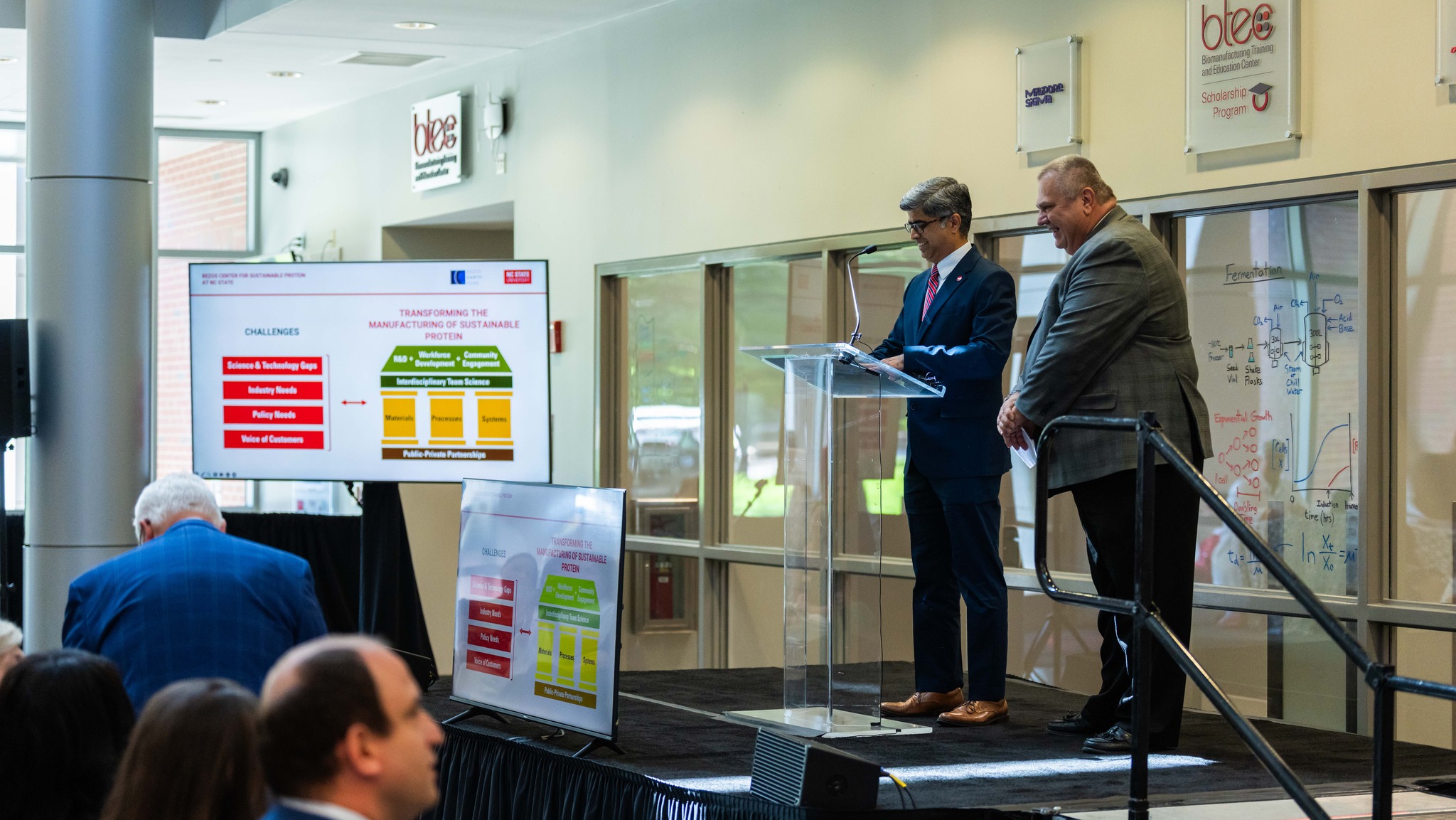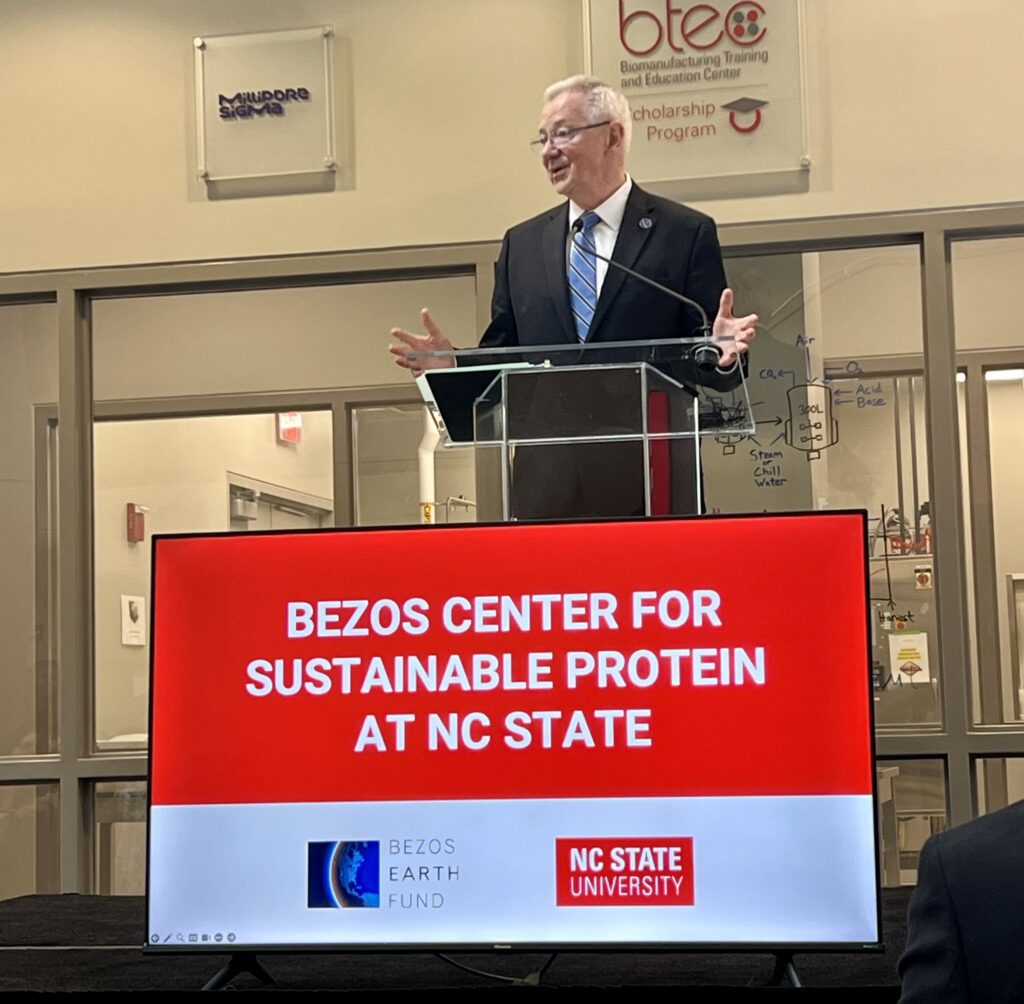Forsyth Tech News
Forsyth Tech is Partner in First Center for Sustainable Protein

Forsyth Tech News

In a groundbreaking development, NC State University announced on Friday, May 31, that it has been awarded a $30 million grant from the Bezos Earth Fund to establish a new research facility focused on sustainable protein. This initiative, called the Bezos Center for Sustainable Protein at NC State, aims to revolutionize the way we produce and consume protein by developing biomanufactured alternatives to traditional animal-sourced meat.
As the global population is projected to reach 10 billion in the next thirty years, the demand for sustainable and affordable food sources, particularly protein, will become increasingly critical. NC State is poised to tackle this challenge head-on, alongside partners at Duke University, NC A & T University, UNC Pembroke, and Forsyth Tech’s National Center for the Biotechnology Workforce. Additionally, there are more than 20 industry partners that will work towards this multi-faceted approach at tackling urgent global problems.
“Finding innovative ways to solve complex problems, well, it’s what we do at NC State,” Chancellor Randy Woodson said, highlighting the university’s commitment to addressing pressing global issues through research and innovation.
NC State’s selection for this grant was no small feat. The university was one of the few institutions invited to apply for funding and the first to receive it. This center is the first in the world of the three that are planned, and the only center that will operate in the United States. Dr. Andrew Steer, President and CEO of the Bezos Earth Fund, praised NC State for its outstanding capabilities, as well as provided information about the plans for the Bezos Earth Fund’s other centers.
We will need to increase food intake by 50% by 2050….We need to use land much more efficiently. Did you know that, since 1970, human beings’ numbers have doubled but the population of every other vertebrate, on average, has fallen by half? We cannot allow that to continue. Did you know that food and agriculture account for nearly 30% of greenhouse gases, and livestock alone accounts for half of that. We cannot solve climate change unless we do something about this. That’s what the beauty of this program is, and the beauty of what North Carolina is doing. You’re going to be driving those possibilities
Dr. Andrew Steer, President & CEO of the Bezos Earth Fund
The establishment of the Center of Sustainable Protein at NC State aligns perfectly with the university’s dual focuses on agriculture and emerging technology, making it an ideal candidate for this ambitious project. “This award will help us create a center that has the potential to serve as an economic development agent for North Carolina, and all over the world as the need for protein grows,” Woodson added.

The grant will fund research into three types of sustainable protein: plant-based, precision fermentation, and cultivated meat grown from animal cells. This diverse approach aims to create a robust and versatile framework for producing healthy and environmentally friendly protein alternatives.
UNC Pembroke will also play a crucial role in this research initiative. Chancellor Robin Gary Cummings emphasized the broader impact of the project, stating, “This initiative is not just about providing immediate assistance. It’s about empowering communities for long-term resilience, long-term health.”
With this significant grant, these partners are set to lead the charge in creating sustainable protein solutions that could transform the global food landscape, ensuring a healthier, more sustainable future for generations to come – and Forsyth Tech will ensure that the workforce needed to support it are trained and ready. Learn more about the National Center for the Biotechnology Workforce here.